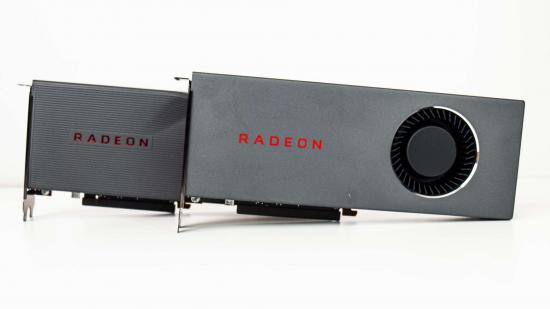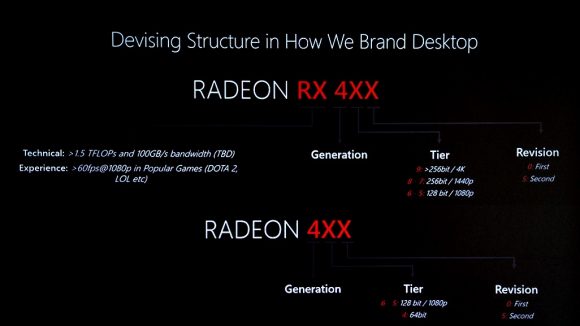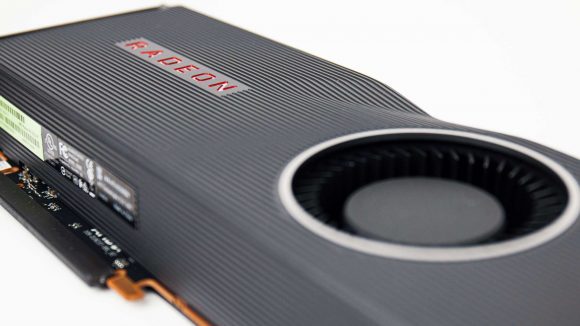AMD is planning to use the Radeon RX 5700 XT naming scheme to create a clear, consistent nomenclature for all of its graphics cards for the next five to ten years. That’s a long time in PC gaming, especially considering it’s used four different naming schemes for graphics cards released in just the past two years.
But that’s what’s driving AMD to ensure it manages to keep its future product names consistent, because, according to the general manager of Radeon, Scott Herkelman, it’s really confused gamers in that time. And any move to create a transparent nomenclature will be hugely welcomed, not just by me, but by most PC enthusiasts too, I would bet.
“If you look over the last four or five years,” says Herkelman, “I think people have been very confused on how our stack lines up – you know, Vega 64, Vega 56, even Radeon VII – we want to clean that up going forward. So if you look at the 5700 XT, we’re going to make this a consistent model naming scheme for the next five to 10 years.”
Herkelman has been talking with Hot Hardware about the new AMD Navi-RDNA graphics cards, and about the strategy it used to bait Nvidia with the initial pricing it released at E3, before slashing the prices of its own cards pre-launch. But he also spent time digging into the new naming scheme the company has employed for the RX 5700-series cards and how that will play out over the next decade.
The idea is to deliver a consistent generation-on-generation line of graphics cards where you will be instantly able to recognise where a card sits in relation to another simply by looking at its numerical code.
Using the RX 5700 XT as an example, Herkelman explains the strategy: “The ‘5’ will be generational, the ‘7’ is the performance in the stack, the ‘00’ will be ‘00’ or ‘50’ depending upon what we’re doing with it. And then XT is usually going to be our top bin, no XT is like our middle bin.”
Honestly, that sounds a lot like the method AMD was using in the past going back to its 200-series cards in 2013 and right up to the Polaris based cards, such as the RX 590 released last year. In fact we know that AMD initially planned to call the RX 5700 XT Anniversary Edition the RX 690 until the last minute change prior to E3, so it was close to carrying on what was already a pretty consistent naming scheme.
It is interesting, however, to note that, like the introduction of the Ryzen 9 3950X, we could see almost half generation updates in the future. We might end up with a Radeon RX 5750 somewhere down the line.
But if this means that there are no bizarre RX Vega 64 or Radeon VII style interludes – or “funky things” as Herkelman refers to them – in this new nomenclature then I’m totally on board with it.
“What we want to do going forward is to make it very clear what you’re buying, how it compares in the stack” he says. “It’s going to take some time to clean that up as our older GPUs get refreshed with our newer GPUs.
“But my commitment to the gamers is I really want to clean that up. I want to make it easier to buy Radeon, more straightforward. And then, generation-to-generation, more consistent so that way our fans don’t need to have a decoder ring just to figure out what GPU to buy.”
It’s a laudable goal, and makes complete sense in a GPU market where naming has been about as consistent as [insert struggling sports team reference here]. After all, what the hell is up with Nvidia switching to the RTX 2000-series and RX Vega turing into Radeon VII?
My only question about this new, consistent naming scheme is what happens after the next four generations of GPU? Do we move onto five figure graphics card codes? A Radeon RX 10750 XT, for example? Or is AMD only expecting to get another four generations out in the next decade? Only time will tell…
Join the conversation about AMD’s new naming scheme in this article’s Facebook and Twitter threads.


